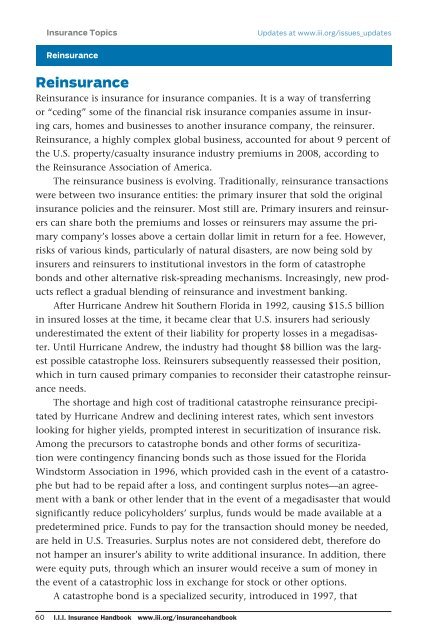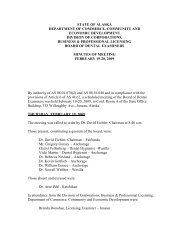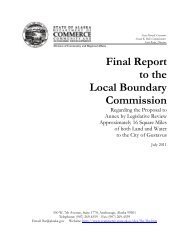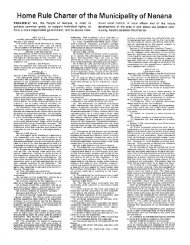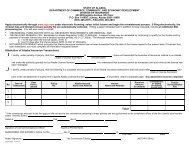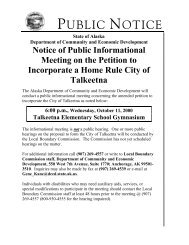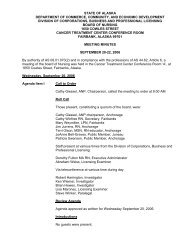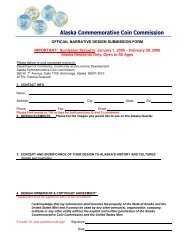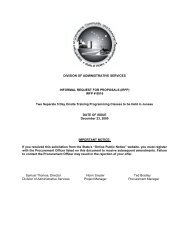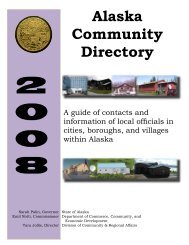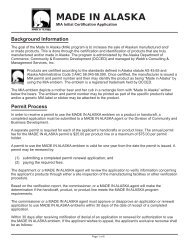Insurance Handbook - Alaska Department of Community and ...
Insurance Handbook - Alaska Department of Community and ...
Insurance Handbook - Alaska Department of Community and ...
Create successful ePaper yourself
Turn your PDF publications into a flip-book with our unique Google optimized e-Paper software.
<strong>Insurance</strong> Topics Updates at www.iii.org/issues_updates<br />
Reinsurance<br />
Auto <strong>Insurance</strong><br />
Reinsurance<br />
Reinsurance is insurance for insurance companies. It is a way <strong>of</strong> transferring<br />
or “ceding” some <strong>of</strong> the financial risk insurance companies assume in insuring<br />
cars, homes <strong>and</strong> businesses to another insurance company, the reinsurer.<br />
Reinsurance, a highly complex global business, accounted for about 9 percent <strong>of</strong><br />
the U.S. property/casualty insurance industry premiums in 2008, according to<br />
the Reinsurance Association <strong>of</strong> America.<br />
The reinsurance business is evolving. Traditionally, reinsurance transactions<br />
were between two insurance entities: the primary insurer that sold the original<br />
insurance policies <strong>and</strong> the reinsurer. Most still are. Primary insurers <strong>and</strong> reinsurers<br />
can share both the premiums <strong>and</strong> losses or reinsurers may assume the primary<br />
company’s losses above a certain dollar limit in return for a fee. However,<br />
risks <strong>of</strong> various kinds, particularly <strong>of</strong> natural disasters, are now being sold by<br />
insurers <strong>and</strong> reinsurers to institutional investors in the form <strong>of</strong> catastrophe<br />
bonds <strong>and</strong> other alternative risk-spreading mechanisms. Increasingly, new products<br />
reflect a gradual blending <strong>of</strong> reinsurance <strong>and</strong> investment banking.<br />
After Hurricane Andrew hit Southern Florida in 1992, causing $15.5 billion<br />
in insured losses at the time, it became clear that U.S. insurers had seriously<br />
underestimated the extent <strong>of</strong> their liability for property losses in a megadisaster.<br />
Until Hurricane Andrew, the industry had thought $8 billion was the largest<br />
possible catastrophe loss. Reinsurers subsequently reassessed their position,<br />
which in turn caused primary companies to reconsider their catastrophe reinsurance<br />
needs.<br />
The shortage <strong>and</strong> high cost <strong>of</strong> traditional catastrophe reinsurance precipitated<br />
by Hurricane Andrew <strong>and</strong> declining interest rates, which sent investors<br />
looking for higher yields, prompted interest in securitization <strong>of</strong> insurance risk.<br />
Among the precursors to catastrophe bonds <strong>and</strong> other forms <strong>of</strong> securitization<br />
were contingency financing bonds such as those issued for the Florida<br />
Windstorm Association in 1996, which provided cash in the event <strong>of</strong> a catastrophe<br />
but had to be repaid after a loss, <strong>and</strong> contingent surplus notes—an agreement<br />
with a bank or other lender that in the event <strong>of</strong> a megadisaster that would<br />
significantly reduce policyholders’ surplus, funds would be made available at a<br />
predetermined price. Funds to pay for the transaction should money be needed,<br />
are held in U.S. Treasuries. Surplus notes are not considered debt, therefore do<br />
not hamper an insurer’s ability to write additional insurance. In addition, there<br />
were equity puts, through which an insurer would receive a sum <strong>of</strong> money in<br />
the event <strong>of</strong> a catastrophic loss in exchange for stock or other options.<br />
A catastrophe bond is a specialized security, introduced in 1997, that<br />
60 I.I.I. <strong>Insurance</strong> <strong>H<strong>and</strong>book</strong> www.iii.org/insuranceh<strong>and</strong>book


